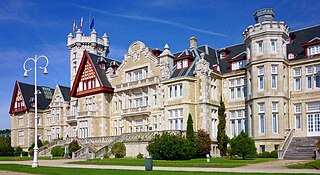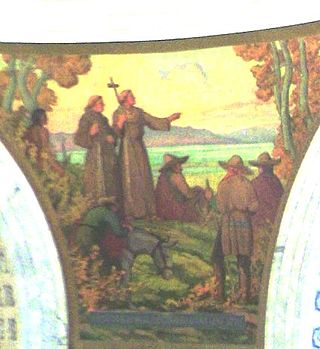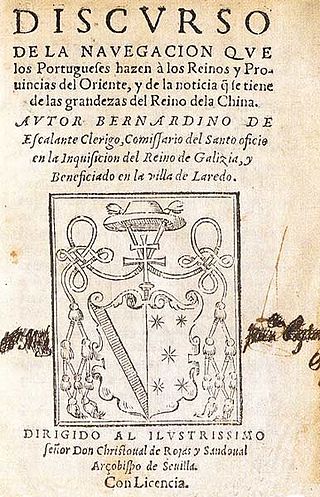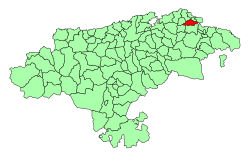
Cantabria is an autonomous community and province in northern Spain with Santander as its capital city. It is called a comunidad histórica, a historic community, in its current Statute of Autonomy. It is bordered on the east by the Basque autonomous community, on the south by Castile and León, on the west by the Principality of Asturias, and on the north by the Cantabrian Sea.

Santander is the capital of the autonomous community of Cantabria, Spain. It has a population of 172,000 (2017). It is a port city located in the northern coast of the Iberian Peninsula, facing the Cantabrian Sea.

Laredo is a town in the autonomous community of Cantabria, Spain. According to the 2008 census (INE), the municipality has a population of 12,648 inhabitants. In addition to Laredo, the municipality includes the villages of La Arenosa, El Callejo, Las Cárcobas, Las Casillas, La Pesquera, Tarrueza and Villante. Except from the last two, the other villages had been physically integrated into Laredo.
Yñigo, Íñigo, or Inigo Ortiz de Retez was a 16th-century Spanish maritime explorer of Basque origin, who navigated the northern coastline of the Pacific–Melanesian island of New Guinea and is credited with bestowing its current name.
The Regionalist Party of Cantabria is the second oldest political party in the Spanish Autonomous Community of Cantabria. The PRC originated in the Association in Defense of the Interests of Cantabria (ADIC), founded on 14 May 1976, with the objective of promoting Cantabrian autonomy.

The Domínguez–Escalante Expedition was a Spanish journey of exploration conducted in 1776 by two Franciscan priests, Atanasio Domínguez and Silvestre Vélez de Escalante, to find an overland route from Santa Fe, New Mexico, to their Roman Catholic mission in Monterey, on the coast of modern day central California. Domínguez, Vélez de Escalante, and Bernardo de Miera y Pacheco, acting as the expedition's cartographer, traveled with ten men from Santa Fe through many unexplored portions of the American West, including present-day western Colorado, Utah, and northern Arizona. Along part of the journey, they were aided by three indigenous guides of the Timpanogos tribe.

The Cantabria autonomous football team is the regional football team for Cantabria, Spain. They are not affiliated with FIFA or UEFA and therefore are only allowed to play friendly matches.
The Divisiones Regionales de Fútbol in the Cantabria, are organized by the Cantabrian Football Federation:

Trasmiera is a historic comarca of Cantabria (Spain), located to the east of the Miera River, reaching the western side of the Asón. It extends between the bays of Santander and Santoña, occupying most of the Eastern seaboard of Cantabria. This piece of coast is known for its cliffs and fine beaches, such as those of Langre, Loredo, Isla, Noja and Berria. Towards the interior, the comarca offers large prairies as well as considerable hotel and camping development.
The Santoña, Victoria and Joyel Marshes Natural Park is an estuary in Cantabria, protected as a natural park. It is one of the wetlands of most ecological value in the north of Spain, and is used as a winter refuge and migratory passage by many species of birds and fishes.

Rayo Cantabria, formerly known as Real Racing Club de Santander "B" is the reserve team of Racing de Santander, a Spanish football team based in Santander, in the autonomous community of Cantabria.
"Himno a la Montaña", or "Himno de Cantabria", is the official anthem of the Spanish autonomous community of Cantabria. It was composed in 1926 by Juan Guerrero Urresti at the behest of the then Provincial Council of Santander and subsequent arrangements by José del Río Sainz, in the region's official anthem.

Bernardino de Escalante was a Spanish soldier, priest, geographer and a prolific writer. He is best known as the author of the second book on China that was published in Europe, and the first author of such a book to obtain wide circulation outside of Portugal.

Erudinus, Erudinu or Erudino was a pagan god in Cantabrian mythology. A stone altar with an inscription dated from the year 161 was found in 1925 by Hermilio Alcalde del Río at the Monte Dobra, near Torrelavega (Cantabria). The inscription says:
CORNE(lius) VICANVS / AVNIGAINV(m) / CESTI(i) F(ilius). ARA(m) / POSSVIT. DEO / ERVDINO. X. K(alendas)/ AVGV(stas). MA(llio). EV(tropio) CO(n)s(ulibus).
Gonzalo Escalante is an Argentine professional footballer who plays as a defensive midfielder for La Liga club Cádiz.

The 2023 Cantabrian regional election was held on Sunday, 28 May 2023, to elect the 11th Parliament of the autonomous community of Cantabria. All 35 seats in the Parliament were up for election. The election was held simultaneously with regional elections in eleven other autonomous communities and local elections all throughout Spain.

Juan de Escalante was a Spanish military man. He joined as a captain on Hernán Cortés' expedition and in 1519 he was commander of the garrison of Veracruz.















